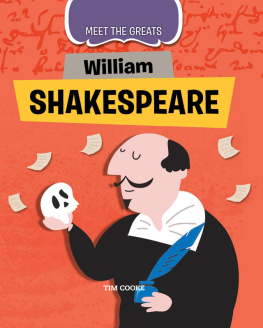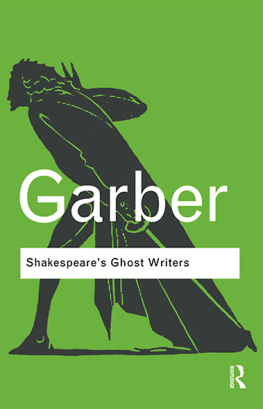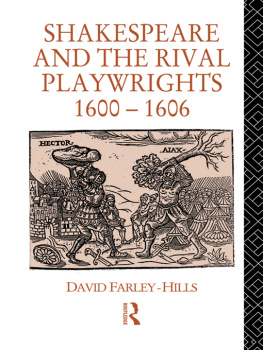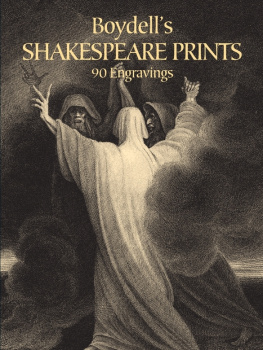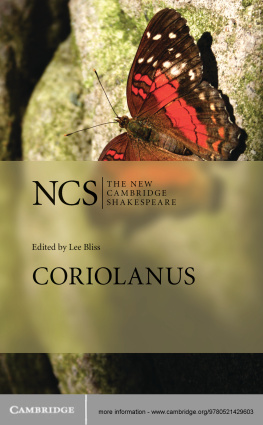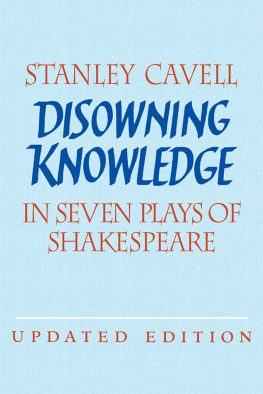With a mixture of historical scholarship and careful critical reading, Graham Holderness makes a very powerful case for seeing Shakespeare as a committed and self-conscious Protestant in his mature works. This crisp and lively book will challenge a number of popular orthodoxies and will stimulate some fresh readings of the major plays; it makes it harder than ever to think of Shakespeare as indifferent to the great questions of faith.
Dr Rowan Williams, academic and theologian
Shakespeares faith was part of his project as a playwright. Graham Holdernesss illuminating account presents Shakespeare as an imaginatively engaged Calvinist of his age, bodying forth on stage a world in which divine will can at best only be hoped for, and for which it is worth risking everything.
Paul Edmondson, The Shakespeare Birthplace Trust, and author of Shakespeare: Ideas in Profile
This book is informative, engaging, and forthright in its argument. Contextualizing Shakespeare historically, Graham Holderness offers careful and incisive readings of a wide range of plays, urging that the playwrights faith is not only discernible but also important to our understanding of Shakespeares extraordinary achievement.
John D. Cox, DuMez Professor of English Emeritus, Hope College
The Bible and the Book of Common Prayer saturate the plays of Shakespeare, yet his religion is elusive and debated. Graham Holdernesss book places the bard in the very centre of the English Reformation and the emergent Anglican tradition. This is a study that everyone seriously concerned to understand Shakespeare should read.
Revd Professor David Jasper, Professor of Literature and Theology, University of Glasgow
This is a timely and helpful book. After decades of wilful secularism, Shakespeare criticism has recently taken a religious turn and fresh work is being done to show the depth and subtlety of the Christian faith that undergirds the plays. Likewise recent work in theology has emphasized the importance of the poetic imagination in our approach to the mystery of faith. Graham Holderness offers a deeply informed and well balanced account both of the Christian context of Shakespeares plays, and more importantly of their Christian content. The debate over Shakespeares personal church allegiance will continue, but The Faith of William Shakespeare illuminates a faith that itself illuminates and is illuminated by the plays. Readers will finish this book with a richer understanding not only of the plays and the period, but of the Christian faith itself.
Malcolm Guite, poet, theologian and chaplain of Girton College

Text copyright 2016 Graham Holderness
This edition copyright 2016 Lion Hudson
The right of Graham Holderness to be identified as the author of this work has been asserted by him in accordance with the Copyright, Designs and Patents Act 1988.
All rights reserved. No part of this publication may be reproduced or transmitted in any form or by any means, electronic or mechanical, including photocopy, recording, or any information storage and retrieval system, without permission in writing from the publisher.
Published by Lion Books
an imprint of
Lion Hudson plc
Wilkinson House, Jordan Hill Road,
Oxford OX2 8DR, England
www.lionhudson.com/lion
ISBN 978 0 7459 6891 9
e-ISBN 978 0 7459 6892 6
First edition 2016
A catalogue record for this book is available from the British Library
Cover image Joana Kruse / arcangel
C ONTENTS
In memory of my brother Stephen 1963 2016
Whom we love, but see no longer.
A CKNOWLEDGMENTS
All quotations from Shakespeare, including act, scene, and line references, are from The Norton Shakespeare: Based on the Oxford Edition , edited by Stephen Greenblatt, Walter Cohen, Jean E. Howard, and Katharine Eisaman Maus (New York and London: W. W. Norton, 1997). Quotations from the Bible, with book, chapter and verse, are from the Geneva Bible, first published 155760 but first published in England as a complete Bible in 1576. Quotations from The Book of Common Prayer are taken from the 1559 edition, and the quotations from the Thirty-nine Articles from the 1662 edition of The Book of Common Prayer . Quotations from John Calvins Institutes of the Christian Religion are taken from the translation by Henry Beveridge (1845).
P REFACE
William Shakespeare was a Christian. He was baptized, married, and buried in the Church of England. In his dramatic works he drew extensively on the English Bible and on The Book of Common Prayer . The world views that emerge from his plays lie firmly within the Christian universe of sixteenth-century Europe, except when he was reconstructing pre-Christian societies such as those of Ancient Greece or Rome. Notwithstanding the familiar claims that his work is universally valuable and of permanent significance (claims which continue to be made by proponents of the present as a secular, post-Christian age), it remains firmly located within the Christian culture of his time.
For over a century following Shakespeares death, while his reputation as one of the greatest British writers grew exponentially, no one thought to comment on his religious beliefs, or lack of them. His Anglican Christianity was simply taken for granted. In the 1780s, scholars editing and interpreting Shakespeares texts began to make observations on his use of religious language and his references to religious doctrines, but they did so without registering any sense of difficulty or awareness of doctrinal conflict. Whether it was Protestant Dr Johnson or Roman Catholic Alexander Pope, Shakespeares early editors and critics saw nothing controversial about his religious opinions. When we consider that the intervening period, between 1616 and the 1780s, had seen religious divisions in Britain deepen to the point of civil war, the abolition of a Catholic-leaning monarchy and the execution of a king, the establishment of a Protestant republic, the restoration of the Stuarts, the deposition of James II for his Catholic sympathies, and the importation of a foreign Protestant monarchy this assumption of an untroubled continuity of religious belief is perhaps remarkable. Eighteenth-century intellectuals seem to have found Shakespeares religious beliefs both congenial and uncontroversial.
Around the middle of the nineteenth century, about the time Christianity began to come under attack from new scientific discoveries and theories such as evolution, scholars began to assert that Shakespeares religious beliefs were of an orthodox Protestant complexion, and that he was a representative product of a Protestant Golden Age of culture and political stability governed by Queen Elizabeth I. Simultaneously, other scholars began to claim that Shakespeare grew up in a still largely Roman Catholic context that had not really been supplanted by the Reformation. At the same time the more enduring and influential hypothesis that Shakespeare was agnostic in matters of religion began to emerge. It was argued that he had the wisdom and prescience to understand that many of the doctrinal and liturgical controversies of his time were historically relative, and of no fundamental importance. In 1866 the Edinburgh Review characterized Shakespeare as a man who avoided the bitter struggles of the Reformation the repeated lurching between Rome and Geneva that he became impatient with the harbour to which he was moored by the accidents of birth, and set sail for the wider ocean of humanity. Scottish historian Thomas Carlyle concurred in his Goethe essay: Shakespeare is no sectarian. Here Shakespeare has been reinvented as a typical free-thinking, non-sectarian, and humanist Victorian intellectual.


